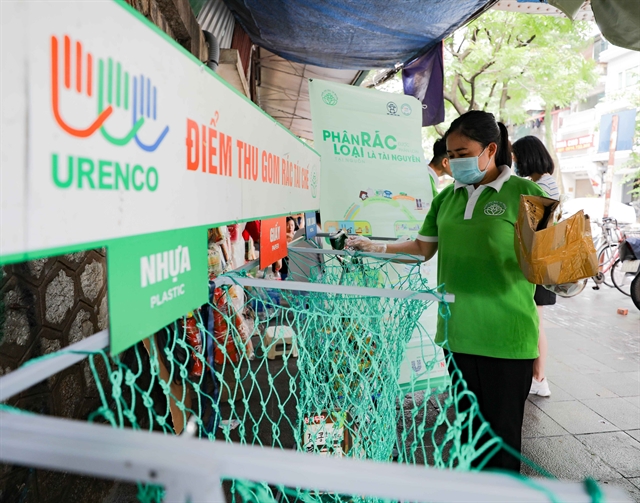Nguyen Thi Huong, Head of the Ha Noi Sub-department of Natural Resources and Environment's Environment Assessment talks to the Tai nguyen & Moi truong (Natural Resources and Environment) online newspaper on how to make traditional plastic waste recycling craft villages become cleaner and greener.

A waste classification point is set up in Ha Noi's Hoan Kiem District to encourage people to sort waste from sources. —VNA/VNS Photo
What is the current status of plastic waste recycling craft villages in Ha Noi?
Together with the development of economic sectors, production in craft villages has grown rapidly. According to the latest statistics from the Ha Noi authorities, the city now has 1,350 traditional craft villages. Plastic waste recycling is mainly done in Trung Van and Trieu Khuc craft villages.
Many recycling villages in the city are small with outdated production technology. Does the Ha Noi authority have any special policies to support waste recycling establishments to apply more advanced and environmental-friendly technology?
The production process of plastic waste recycling in Trung Van and Trieu Khuc villages still follows traditional methods. Waste water from the recycling process was discharged directly into the environment without being treated, seriously affecting the lives of local residents.
To help tackle environmental pollution at waste recycling craft villages, the Ha Noi Department of Natural Resources and Environment has come up with a number of measures, including providing technical support for households trading or recycling plastic waste.
Regarding waste water treatment, local producers will be guided to apply biological treatment to protect the environment.
Measures are also taken to increase dissemination to raise public awareness of the negative impacts of plastic waste recycling to their health as well as public health and of protecting the environment at craft villages.
Do you have any comments on the introduction of more environment-friendly products to replace the single-use plastic products?
Growing concerns about the increase of single-use plastic products have encouraged many initiatives that have been widely welcomed by consumers, including environmental-friendly products such as straws, bottles, cups and bags made of glass, bamboo or paper
The use of convenient and environment friendly products has shown good progress in changing awareness of organisations, businesses and individuals in environment protection.
Vietnamese people are more aware of the urgent need to protect the environment so the use of such products has increased rapidly recently. Many consumers are willing to pay higher prices for products with “greener and cleaner” commitment.
However, it still needs mechanisms, policies and measures to keep quality of these environmental-friendly products under control.
Do you have any suggestions to help boost the production and consumption of environmental-friendly products?
Firstly, it is necessary to have a legal framework on the management of solid waste towards considering waste and plastic waste as a natural resource and effectively carry out waste classification at source.
It is also needed to study and propose a mechanism to limit the production and consumption of single-use plastic products and build a roadmap to gradually ban the production and use of these products.
Meanwhile, the Ha Noi Department of Industry and Trade should work together with the Ha Noi Department of Natural Resources and Environment to create an alliance chain to introduce environmental-friendly products replacing single-use plastic ones.